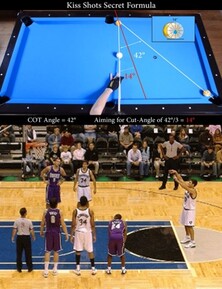
Colleagues suggested that darts might be an alternative to billiards. This suggestion took me to a Tinbergen Institute discussion paper titled "Incentives, Performance and Choking in Darts". The paper has much to recommend it. The paper finds that professional players do better than amateur and youth players. It is somewhat related to the billiards illustration presented by Friedman and Savage paper. However, the paper forced me to return to a neat 2017 Journal of Sports Economics paper by Mattie Toma.
Toma's paper examines the determinants of choking using shots from the free-throw line in basketball. Free-throw line shots in basketball are not dissimilar to throwing darts. Toma says "... college players destined to go pro choke dramatically more than do their counterparts who never make it to the professional level". Choking might be a predictor of success! Toma says, and here I'm paraphrasing, it could be because these college players care more about the outcome.
Under the heading "keywords", Toma lists "behavioral economics". What do these findings bring to behavioral economics? Behavioral economists frequently criticise the example of the expert billiard player used by Friedman (and Savage). Richard Thaler devotes some time to the debate in Misbehaving: The Making of Behavioral Economics. Thaler also discusses the literature on the "mistakes" made in drafting college players. The discussion in the Toma paper makes it clear that the author is not suggesting that the incorrect players are drafted. Instead, the author lists the limitations of the study as a guide to future professional careers and, more importantly, raises the potential that choking might be because of emotional investment in the sport.
Toma's paper, and the literature on choking in sport, raises issues for economics (including behavioral economics). The literature attributes choking to situations where the player thinks too much. Where the player engages in conscious thought about what they are about to do. Choking arises because the player engages System 2 reflective type thinking (a classification found in some accounts of behavioral economics). Performances are better where players rely on actions they have internalised and automated. Intuitive System 1 type thinking does better than reflective System 2 type thinking. Is this an anomaly for (behavioral) economics?
 RSS Feed
RSS Feed